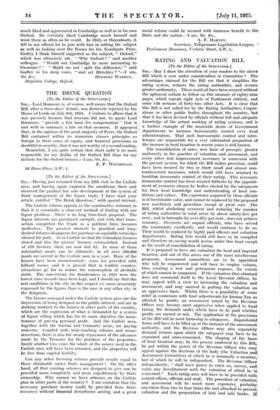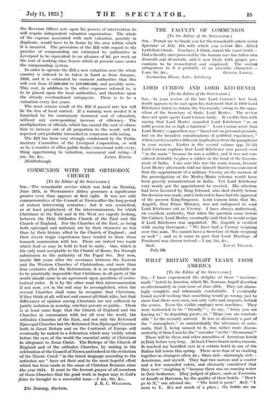RATING AND VALUATION BILL [To the Editor of the SPECTATOR.]
SIR,—May I draw the attention of your readers to the above Bill which is now under consideration in Committee ? The advantages claimed for the Bill are that it simplifies the rating system, reduces the rating authorities, and secures greater uniformity. These could all have been secured without the upheaval certain to follow on this measure of eighty-nine pages, which repeals eight Acts of Parliament entirely, and some 150 sections of forty-two other Acts. It is clear that this Bill is not called for by the Rating Authorities, Corpor- ations or other public bodies throughout the country, but that it has been devised by officials without full and adequate knowledge of the actual working of rating systems, and is a further example of the insatiable desire of Government departments to increase bureaucratic control over local administration. That such bureaucratic control and inter- ference are responsible for a very substantial proportion of the increase in local taxation in recent years is well known.
The consolidation of rates, new basis of precepts, greater uniformity in the practice of valuation and assessment, and every other real improvement necessary in connexion with the present system, for which the Bill makes provision, could have been secured by two or three small and almost non- controversial measures, which would still have retained to localities democratic control of their rating. This necessary, democratic control has been secured hitherto by the appoint- ment of overseers chosen by bodies elected by the ratepayers for their local knowledge and understanding of local con- ditions and values. The experience acquired by these officials is of inestimable value, and cannot be replaced by the proposed new machinery and procedure except at great cost. The Bill, whilst abolishing overseers and reducing the number of rating authorities in rural areas by about ninety-five per cent., and in boroughs by over fifty per cent., does not achieve economy. Overseers are unpaid officials, who have served the community excellently, and would continue to do so:' They would be replaced by highly paid officials and valuation departments. Rating lists would still have to be compiled and therefore no saving would accrue under this head except as the result of consolidation of rating.
It is proposed to have one valuation for local and imperiall taxation, and out of this arises one of the most mischievous proposals. Assessment committees are to be appointed who will be empowered and will have to employ valuers,; thus creating a new and permanent expense, the extent of which cannot be computed. If the valuation thus obtained; does not commend itself to the Local Revenue Officer, he may appeal with a view to increasing the valuation and assessment, and may succeed in putting the valuation oft an oppressive basis. Whilst there is a possibility of some relief in connexion with final adjustments for Income Tax as affected by profits, an assessment raised by the Revenue Officer may become most oppressive when applied to local rating, the demands under which have to be paid whether, profits are earned or not. The application of the provisions of the Bill will be most harassing to ratepayers. Inquisitorial) forms will have to be filled up at the instance of the assessment authority, and the Revenue Officer may also separately, demand returns upon which the ratepayer may have to be examined and cross-examined. The shaping of the basis of local taxation may, by the powers conferred by this Bill) be put within the power of the Revenue Officer who may( appeal against the decisions of the body (the Valuation and( Assessment Committee) of which he is nominally a member,
but of which he will be independent. The Revenue Office independently, shall have power to enter on, survey, an value any hereditament with the valuation of which he i concerned." Each rating area will have to be provided wit central offices, officials and staff. The procedure of valuatio and assessment will be much more expensive, probably anywhere from two to four times the cost attached to presenh valuation and the preparation of lists and rate books. Irk !the Revenue Officer acts upon his powers of intervention he !will require independent valuation organization. The whole i of the expense associated with such valuation, possibly in 'duplicate, would have to be borne by the area within which It is incurred. The provisions of the Bill with regard to the practice of compounding are estimated by authorities in ;Liverpool to be equivalent to an advance of 9d. per week on !the rent of working class houses which at present come under the compounding system.
In order to operate the Bill a new valuation over the whole country is ordered to be taken in hand as from January, ,1926, and it is estimated by eminent authorities that this will cost from £7,000,000 to £10,000,000, and possibly more. ',This cost, in addition to the other expenses referred to, is to be placed upon the local authorities, and therefore upon the already overburdened ratepayers. There is to be a ;valuation every five years.
The most serious result of the Bill if passed into law will be the loss of local control. If a warning were needed it is ;furnished by the enormously increased cost of education, ;without any corresponding increase of efficiency. The ,multiplication of officials, which has caused the cost of educa- tion to increase out of all proportion to the result, will be repeated and probably intensified in connexion with rating.
The Bill has been very strongly condemned by the Parlia- mentary Committee of the Liverpool Corporation, as well as by a number of other public bodies conversant with every- thing appertaining to valuation, assessment and rating.—I



























































 Previous page
Previous page